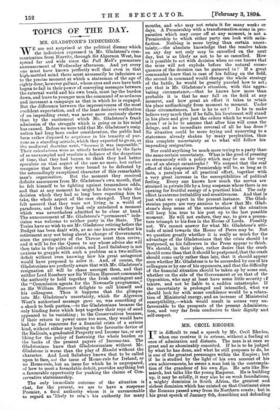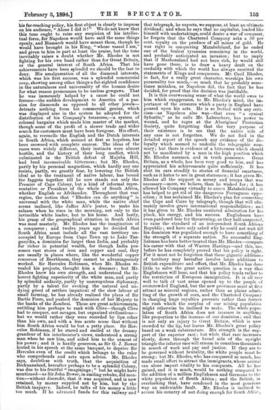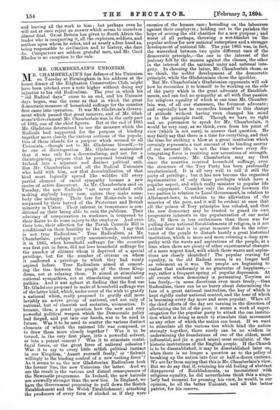MR. CECIL RHODES.
IT is difficult to read a speech by Mr. Cecil Rhodes, when one receives it in extenso, without a feeling at once of admiration and distaste. The man is at once so great and so abominably conceited. If he is to be judged by what he has done, and what he still proposes to do, he is one of the greatest personages within the Empire ; but if he is studied by the light of his own account of his own achievements, he seems a man lost in the contempla- tion of the grandeur of his own Ego. He acts like Bis- marck, but talks like the young Emperor. He is building up, it may be solidly, it may also be on weak foundations, a mighty dominion in South Africa, the greatest and richest dominion which has existed on that Continent since the Romans passed away from its Northern coasts ; but in his great speech of January 6th, describing and defending his far-reaching policy, his first object is clearly to impress on his audience, "Alone I did it ! " We do not know that this tone ought to raise any suspicion of his intellec- tual force, for Napoleon would have said the same things openly, and Bismarck would have meant them, though he would have brought in his King, "whose vassal I am," and given to him in part at least the praise, but the tone inevitably raises a doubt whether Mr. Rhodes is not fighting for his own hand rather than for Great Britain, or the general interest of South Africa. That his achievements have been splendid we should be the last to deny. His amalgamation of all the diamond interests, which was his first success, was a splendid commercial coup, showing among other things a far-sighted confidence in the naturalness and universality of the human desire for what reason pronounces to be useless gewgaws. That he was immensely helped by a cause he could not foresee—the sudden development in America of a pas- sion for diamonds as opposed to all other jewels— detracts nothing from his commercial genius, which was displayed also in the system he adopted for the distribution of his Company's treasures,—a system of colossal bargains which made him master of the market, though some of the profit of a slower trade and wider search for customers must have been foregone. His effort, again, to reconcile the English and the Dutch interests in South Africa, which seemed at first so hopeless, has been crowned with complete success. The ideas of the races were widely different, their instincts were almost hostile, and the history of their long conflict, which culminated in the British defeat of Majuba Hill, had bred. inconceivable bitterness ; but Mr. Rhodes, partly by his personal magnetism, which hardly any one resists, partly, we greatly fear, by lowering the British ideal as to the treatment of native labour, has bound the faggots together till he now stands not only the Premier of Cape Colony, but a kind of informal repre- sentative or President of the whole of South Africa, whether English or Afrikander. Throughout that vast region, the notion that "Rhodes can do anything" is universal with the white man, while the native chief seems inclined, like Jaffier Ali's jester, to make his salaam when he rises in the morning, not only to the invincible white leader, but to his horse. And lastly, his grasp of the geographical situation in South Africa was most masterly. Mr. Rhodes has the imagination of a conqueror ; and twelve years ago he decided that South Africa must include all the vast territory un- occupied by Europe from Cape Town up to Lake Tan- ganyika, a dominion far larger than India, and probably far richer in potential wealth, for though India pos- sesses vast stores of iron and copper and coal, they are usually in places where, like the wonderful copper resources of Beerbhoom, they cannot be advantageously worked. Sir Hercules Robinson, when Mr. Rhodes re- vealed his projects, thought him a dreamer ; but Mr. Rhodes knew his own strength, and understood the in- herent fighting superiority of the white man, and partly by splendid audacity, partly by unscrupulous diplomacy, partly by a talent for evoking the natural and un- dying greed of settlers impatient of the slow labour of small farming, he has already realised the plans of Sir Bartle Frere, and pushed the dominion of her Majesty to the banks of the Zambesi. Those are great achievements, entitling him perhaps to rank with Clive—though Clive had to conquer, not savages, but organised civilisations— but we would rather they were recorded by lips other than his own, and with a less acute sense that without him South Africa would be but a petty place. Sir Her- cules Robinson, if he stared and smiled at the dreamy grandeur of his interlocutor's views, understood atro s ng man when he saw him, and aided him to the utmost of his power ; and it is hardly generous, as Sir G. J. Bower hinted in his speech at the same banquet, to deprive Sir Hercules even of the credit which belongs to the ruler who comprehends and acts upon advice. Mr. Rhodes says, doubtless with truth, that the acquisition of Bechuanaland, hereafter perhaps to be a splendid Colony, was due to his fruitful " imaginings ; " but he might have mentioned—as Sir John Bower, in smiling rebuke, did men- tion—without discredit, that it was acquired, and is now retained, by money supplied not by him, but by the British taxpayer. Indeed, he talks of his money a little too much. If he advanced funds for this railway and that telegraph, he expects, we suppose, at least an ultimate dividend; and when he says that no capitalist, loaded like himself with undertakings, could desire a war of conquest, he forgets that the Chartered Company asks a 50 per cent, royalty on the produce of all mines of gold. He was right in conquering Matabeleland, for he ended one of the foulest tyrannies remaining in the world, and probably anticipated an invasion ; but to imply that if Mashonaland had not been rich, he would still have gone there, is to draw a heavy draft on the credulity with which the world has always received the statements of Kings and conquerors. Mr. Cecil Rhodes, in fact, for a really great character, worships his own personality too much,—so much that he probably some- times mistakes, as Napoleon did, the fact that he has decided, for proof that the decision was justifiable. It is this overweening sense of what the world owes to him which exaggerates, to Mr. Rhodes's mind, the im- portance of the censures which a party in England have poured upon his acts. He is so fretted with any criti- cism—as Napoleon also was—that even "a cynical Sybarite," as he calls Mr. Labouchere, has power to wound, and he rages at the Aborigines' Protection Society, quite forgetting that the very purpose of their existence is to see that the native side of any case is not forgotten. We do not find in the detailed report of the speech any evidence of the dis- loyalty which seemed to underlie the telegraphic sum- mary; but there is evidence of a bitterness which should not be manifested by a man in the high position which Mr. Rhodes assumes, and in truth possesses. Great Britain, as a whole, has been very good to him, and has appreciated his achievements quite sufficiently. It has shut its ears steadily to stories of financial smartness, such as it hates to see in great statesmen ; it has given Mr. Rhodes all the support in money and troops that was necessary—more, we believe, than he wished for ; it has allowed his Company virtually to annex Matabeleland ; it has helped to get rid of the dangerous Portuguese oppo- sition; it has acclaimed Mr. Rhodes's plan for connecting the Cape and Cairo by telegraph, though that will ulti- mately involve grave international responsibilities ; and it has given to Mr. Rhodes unstinted admiration for his pluck, his energy, and his success. Englishmen have even pardoned him fcr threatening, as they half-suspected, to raise the standard of an independent South African Republic ; and have only asked why he could not wait till his dominion was populated enough to have something of the strength of a separate nation. No successful Eng- lishman has been better treated than Mr. Rhodes—compare his career with that of Warren Hastings—and this, too, before he has completely proved that his policy is right. For it must not be forgotten that these gigantic additions of territory may hereafter involve large additions to British expenditure and effort, that Mr. Rhodes has done little to solve the great native question in a way that Englishmen will bear, and that his policy tends rather to the restriction of European immigration. It is all very well to talk of vast areas opened up to the people of overcrowded England, but the new provinces must at first attract as mineral regions, rather than as plains admit- ting of the growth of corn, and the Chartered Company in charging huge royalties prevents rather than fosters the rush which the surplus of our mining population might otherwise be inclined to make. The white popu- lation of South Africa does not increase in anything like proportion to the increase of our dominion ; and that is not only an injury to Great Britain, which is now crowded to the lip, but leaves Mr. Rhodes's great policy based on a weak substructure. His strength is the sup- port of the superior race ; but while that race increases slowly, down through the broad side of the upright triangle the inferior race will stream in countless thousands in search of work and pay and justice. If they are to be governed without brutality, the white people must be strong ; but Mr. Rhodes, who has conquered so much, has made small effort to attract the immigrants, whose arrival can alone impart vitality to his conquests. All he has gained, and it is much, would be nothing compared to the addition of a million Englishmen and Germans to the white population of South Africa ; and the British, in overlooking that, have condoned in the most generous way an undeniable fault. Mr. Rhodes is inclined to accuse his country of not doing enough for South Africr, and leaving all the work to him ; but perhaps even he will not at once reject an answer which seems to ourselves almost final. Great Britain has given to South Africa the leader who is conquering it, all the explorers, soldiers, and settlers upon whom he relies, and as nearly a free hand as, being responsible to civilisation and to history, she dare do. Conquerors are seldom grateful men, and Mr. Cecil Rhodes is no exception to the rule.




































 Previous page
Previous page